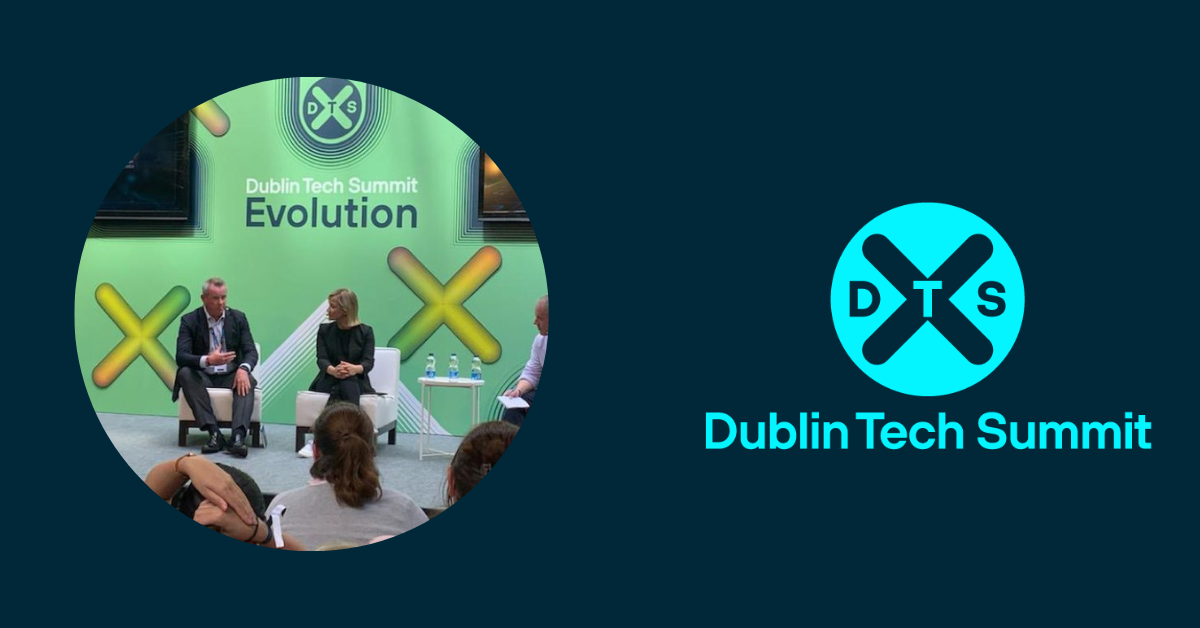As digital technologies continue to permeate and transform every aspect of a company’s operations, it’s presenting new challenges – and opportunities – for the owners, managers and employees at those firms. At Dublin Tech Summit, Skillnet Ireland Chief Strategy Officer, Mark Jordan recently joined a panel discussion titled “Tales of Digital Transformation” to discuss some of those experiences.
With the conversation discussing digital transformation and the talent needs to ensure it is successfully executed, we asked Jordan about the recurring themes that cropped up amongst businesses.
“The most common issue was around some businesses who continue to operate in a traditional way and haven’t changed very much over the years. When younger generations take over a business, they are looking at technical and operational solutions as well as backend support in a more automated way. This is transformational change where a certain process has operated for a long time and a new mindset for the business comes in and brings about change,” Jordan said.
Engagement with the workforce
According to Jordan, what was noticeable at Dublin Tech Summit was that the smart companies made sure they engaged staff on the digital transformation journey early on.
“The ones that do it well are the ones that can firm up their engagement with their staff by being upfront and outlining where they see the transformation happening and the areas they would like to highlight. Sharing with employees where they see added value in a particular solution and the benefits it can bring and ways in which to implement it,” he added.
Who implements digital transformation?
Jordan highlighted that it is the owners and managers of smaller and medium sized businesses who are driving digital strategy and transformation.
“As businesses get bigger it is the managerial framework and particularly the change management who implement digital transformation. From Skillnet Ireland’s perspective, we want to support those decision makers and ask questions such as ‘where are you taking your business?’; ‘where do you see yourselves going?’ Let’s talk about your talent and how inclusive are you and if you are bringing your staff along the talent development journey which leads to improved retention,” Jordan commented.
Jordan said: “We have a number of transformation initiatives particularly in the technology, MedTech, financial services and retail sectors. The programmes co-designed with industry help streamline your business and highlight what your talent plan should look like. We’ve seen major transformation within the financial services sector with programmes like the Global Business Services Masters programme where we’re creating leaders. We continue to grow the number of companies we support year on year and the intensity level in each company.”
Supporting scaling SMEs
Jordan notes that scaling SMEs looking to grow is a key priority: “The Innovation Exchange is helping to bring about this growth as it brings SMEs with solutions to pitch to multinationals and large indigenous companies.”
Launched in 2022, The Innovation Exchange facilities collaboration between Irish SME’s and large multinationals to boost innovation. It will support over 1,000 companies between 2022-2025 period and is managed by Furthr (formerly Dublin BIC) in partnership with Skillnet Ireland. The initiative was developed to address the barriers that exist for SMEs engaging with corporates and government.
“It’s amazing the sheer number of great multinational tech firms operating in Ireland and the strong presence of Irish digital start-ups that have the potential to boost cost management, sustainable business practices and help SMEs to optimise their business. This marketplace concept can grow, and SMEs will require support to prepare talent for those solutions. Our Irish tech businesses are proving to be successful not only in Ireland, but internationally as well. We have four unicorns, but we need 40 to be really challenging as a global force in terms of productivity and success,” Jordan added.
From micro-credentials to PhDs
According to Jordan, Skillnet Ireland work across industries from micro-credentials to a PhDs in data sciences will deliver a major impact on the day-to-day performance and competitiveness of Irish companies.
Jordan highlighted the impact of the pandemic on how business owners and managers mindset in relation to upskilling: “During the pandemic, employers were more understanding of individuals upskilling because for the most part the workforce couldn’t go anywhere. Some individuals gained micro-credentials during that period. We see a growth in shorter programmes leading to recognised qualifications.”
Accelerating digital
Skillnet Ireland is co-creating programmes and pathways to ensure that businesses have the right talent in place for digital transformation. However, some businesses need a change in mindset to become a stronger learning environment for new recruits, especially from secondary and third level education.
Jordan noted: “We have a very structured primary school, secondary and third level system in terms of how you learn and when you learn. When you move into the workplace there is often no talent development structure, and they tend to hire the finished article with a degree. There is an assumption that they don’t need to develop expertise or to invest in that individual. You can find that people are not engaging with lifelong learning for 10 years after third level.”
“We need to build a better pathway in the workforce with continual learning and get business to invest in that and improve the performance of each individual. It’s a mindset we need to instil in every small business in Ireland.”
Stay connected with Skillnet Ireland
Receive regular news and insights from the world of talent development straight to your inbox.
By adding my email, I agree to the use of my personal data in accordance with Skillnet Ireland Privacy Policy.



